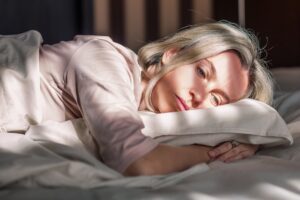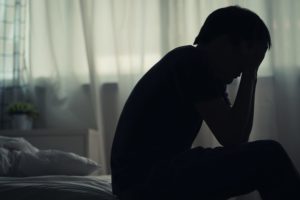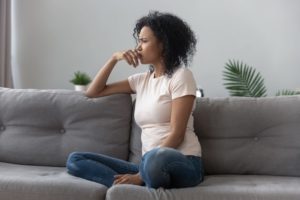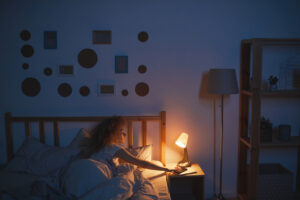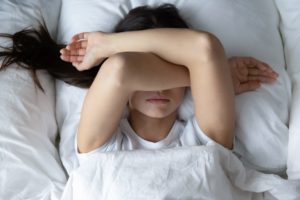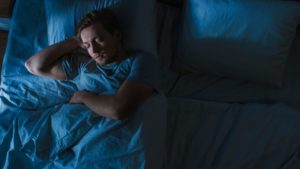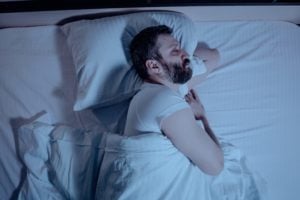Anxiety at Night: Causes and Tips for Relief
- Various factors contribute to anxiety at night, including stress, trauma, and insomnia.
- Nighttime anxiety can lead to difficulties falling asleep or staying asleep.
- Mindfulness and deep-breathing exercises can help alleviate anxiety before bed.
- For persistent nighttime anxiety, seek professional help to address underlying issues and promote better sleep.
Everyone experiences anxiety on occasion. In fact, experts believe that anxiety is an important way for the body to stay alert, focused, and prepared to respond to a stressful situation. But anxiety can also be accompanied by racing thoughts and physical symptoms that may get worse at night and make it difficult to sleep.
While anxiety is often a temporary experience, when it persists or gets worse over time it can develop into an anxiety disorder. We delve into the causes of nighttime anxiety, how to calm anxiety at night, and when to talk to a doctor about persistent anxiety and sleep problems.
Is Your Troubled Sleep a Health Risk?
A variety of issues can cause problems sleeping. Answer three questions to understand if it’s a concern you should worry about.
What Causes Anxiety at Night?
Whether it occurs at night or during the day, anxiety is caused by the body’s response to a potential threat. Researchers have found a wide variety of factors that can trigger or increase a person’s anxiety.
- Lack of sleep: People who do not usually get the recommended amount of sleep have been found to experience more mental distress , which can include stress and anxiety. Studies also show that when a person gets less sleep than they are accustomed to, they have heightened anxiety the next day .
- Life stressors: Stressful life events, like work troubles, illness, or the death of a family member, can cause a person to feel temporarily distressed and anxious. In some people, anxiety disorders may begin after a particularly difficult life stressor .
- Traumatic experiences: People often feel anxious in the weeks after a traumatic event , like a natural disaster, act of violence, or car crash. Childhood trauma can also make a person more likely to experience panic attacks or excessive worry as an adult.
- Genetics: Research has found that multiple genes may make a person more likely to develop an anxiety disorder. A person who is genetically predisposed to anxiety may develop a disorder after experiencing trauma or significant life stressors.
- Medication side effects: Certain medications can produce side effects that include anxiety. For example, starting or increasing the dosage of steroids, amphetamines, or antihistamines has been associated with anxiety and panic-like symptoms. Similarly, substances like caffeine and nicotine can trigger anxiety.
Why Is Anxiety Worse at Night?
Anxiety can get worse at night as people find themselves focusing more on their worries once they are lying in bed without the distractions of the day. For example, sometimes people with insomnia may begin to develop worries about whether or not they will be able to fall asleep. These worries may then exacerbate insomnia and make falling asleep even more difficult.
Additionally, several other conditions can flare up at night, causing anxiety. For example, people with nightmare disorder often feel distressed after waking up from a nightmare. Post-traumatic stress disorder (PTSD) also involves nightmares and disrupted sleep. And nocturnal panic attacks can cause a person to wake up during the night feeling anxious and like something bad is about to happen.

Symptoms of Anxiety at Night
The symptoms and severity of anxiety vary widely. A person experiencing anxiety may notice symptoms at night such as:
- Worry or fear about the future
- Restlessness
- Headaches, stomachaches, or other pains
- Tense muscles, increased heart rate, or sweating
- Shortness of breath or chest discomfort
- Dizziness
- Trembling, chills or tingling sensations
- Flashbacks of a traumatic event or nightmares
How Anxiety Impacts Sleep
Anxiety and worry can interfere with a person’s ability to fall or stay asleep. One reason for these effects is that anxiety can trigger the body’s stress response . This stress response sets off a cascade of effects throughout the body that can leave a person feeling too wound up or agitated to fall asleep.
Additionally, anxiety can continue to affect the body after a person falls asleep and change how they move through the stages of sleep. For example, more anxious people have been found to spend less time in the rapid eye movement (REM) stage of sleep. Anxiety is also associated with less time spent in deep sleep, which is thought to be important for restoring the body and mind.
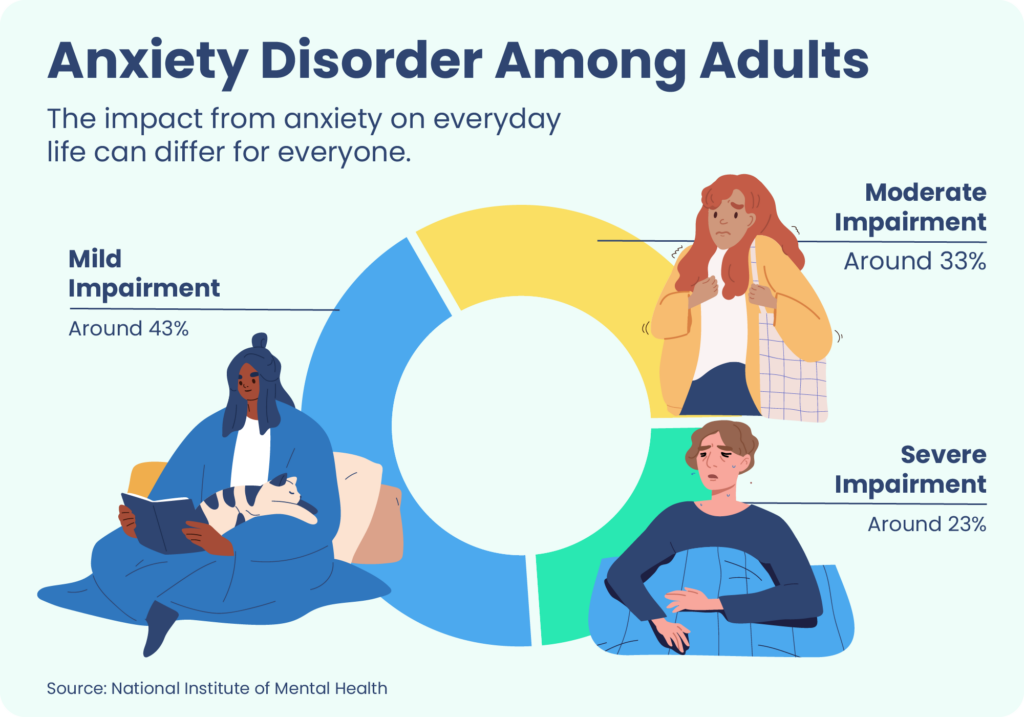
How to Calm Anxiety at Night
People who have anxiety at night can try multiple techniques to relieve stress and help reduce anxiety.
- Breathing exercises: Practicing slow, deep breathing may help people manage excessive worry and combat insomnia. Breathing exercises may promote sleep by reducing arousal in the nervous system and increasing relaxation.
- Progressive muscle relaxation: Learning to tense and relaxing muscles in the body one group at a time is another technique that promotes relaxation. This technique is commonly used to treat panic attacks, excessive worry, and insomnia. Breathing exercises and progressive muscle relaxation can also be used together.
- Writing: If a person’s nighttime anxiety stems from worrying about tasks they must complete in the future, research suggests that writing before bed may help. Specifically, people who write a detailed to-do list outlining tasks they need to complete have been found to fall asleep faster.
- Exercise: Engaging in regular exercise has been found to reduce anxiety, both in people who have anxiety disorders and those who do not. Physical activity may also help improve sleep in people with insomnia, particularly older adults.
- Therapy for anxiety: When anxiety begins to interfere with a person’s sleep or waking life, seeking professional treatment may help. Mental health professionals can offer support and a variety of tools for coping with anxiety.
- Therapy for insomnia: Cognitive behavioral therapy for insomnia (CBT-I) is a type of therapy that is usually the first treatment recommended for people with insomnia, including people whose insomnia is linked to anxiety at night.
- Support groups: Sometimes a support group is helpful when a person is dealing with anxiety. Support groups may be available in-person or online, and are sometimes overseen by a mental health professional.
Talking to Your Doctor About Nighttime Anxiety
Reach out to your doctor if you suspect that your nighttime anxiety is more than just occasional worry. Experts encourage people to bring up their mental health concerns with their primary care provider , who can refer to a specialist if necessary and discuss medications and other treatment options.
Be honest with your doctor about your symptoms, providing details about how long they have been happening and how severe they feel. Even if your nighttime anxiety does not feel severe, talk to your doctor if your sleep is disrupted enough that it impacts your daytime activity. A doctor can help you determine if a sleep disorder or underlying health problem may be causing your symptoms.
Keeping a sleep diary for a week or two prior to your doctor’s visit may help them better understand what you are experiencing. To keep a sleep diary, write down when you fall asleep, when you wake up, when you nap, when you feel tired, and when you exercise or ingest caffeine or alcohol during the day.

Still have questions? Ask our community!
Join our Sleep Care Community — a trusted hub of sleep health professionals, product specialists, and people just like you. Whether you need expert sleep advice for your insomnia or you’re searching for the perfect mattress, we’ve got you covered. Get personalized guidance from the experts who know sleep best.
References
12 Sources
-
National Institute of Mental Health. (2022, April). Anxiety disorders.
https://www.nimh.nih.gov/health/topics/anxiety-disorders -
Chand, S. P., & Marwaha, R. (2022, May 8). Anxiety. In StatPearls. StatPearls Publishing.
https://www.ncbi.nlm.nih.gov/books/NBK470361/ -
Blackwelder, A., Hoskins, M., & Huber, L. (2021). Effect of inadequate sleep on frequent mental distress. Preventing Chronic Disease, 18, E61.
https://pubmed.ncbi.nlm.nih.gov/34138697/ -
Cox, R. C., Sterba, S. K., Cole, D. A., Upender, R. P., & Olatunji, B. O. (2018). Time of day effects on the relationship between daily sleep and anxiety: An ecological momentary assessment approach. Behaviour Research and Therapy, 111, 44–51.
https://pubmed.ncbi.nlm.nih.gov/30300779/ -
Tibubos, A. N., Burghardt, J. Klein, E. M., Brähler, E., Jünger, C., Michal, M., Wiltink, J., Wild, P. S., Münzel, Singer, S., Pfeiffer, N., & Beutel, M. E. (2021). Frequency of stressful life events and associations with mental health and general subjective health in the general population. Journal of Public Health, 29, 1071–1080.
https://link.springer.com/article/10.1007/s10389-020-01204-3 -
National Institute of Mental Health. (2022, May). Coping with traumatic events.
https://www.nimh.nih.gov/health/topics/coping-with-traumatic-events -
Roy-Byrne, P. P. (2022, February 9). Panic disorder in adults: Epidemiology, clinical manifestations, and diagnosis. In M. Friedman (Ed.). UpToDate.
https://www.uptodate.com/contents/panic-disorder-in-adults-epidemiology-clinical-manifestations-and-diagnosis -
Baldwin, D. (2022, April 18). Generalized anxiety disorder in adults: Epidemiology, pathogenesis, clinical manifestations, course, assessment, and diagnosis. In M. B. Stein (Ed.). UpToDate.
https://www.uptodate.com/contents/generalized-anxiety-disorder-in-adults-epidemiology-pathogenesis-clinical-manifestations-course-assessment-and-diagnosis -
American Psychological Association. (2022, February 14). What’s the difference between stress and anxiety?
https://www.apa.org/topics/stress/anxiety-difference -
American Psychological Association. (2018, November 1). Stress effects on the body.
https://www.apa.org/topics/stress-body -
Coles, M. E., Schubert, J. R., & Nota, J. A. (2015). Sleep, circadian rhythms, and anxious traits. Current Psychiatry Reports, 17(9), 73.
https://pubmed.ncbi.nlm.nih.gov/26216591/ -
National Institute of Mental Health. (n.d.). Tips for talking with a health care provider about your mental health.
https://www.nimh.nih.gov/health/publications/tips-for-talking-with-your-health-care-provider


